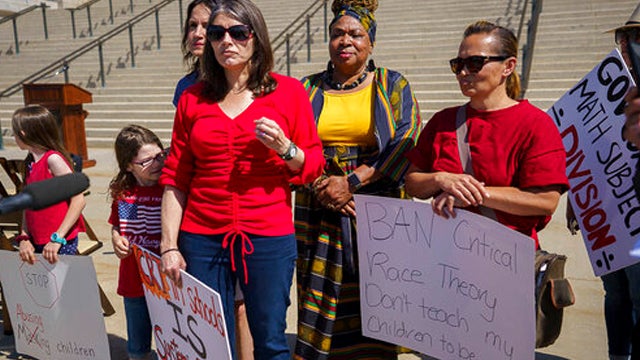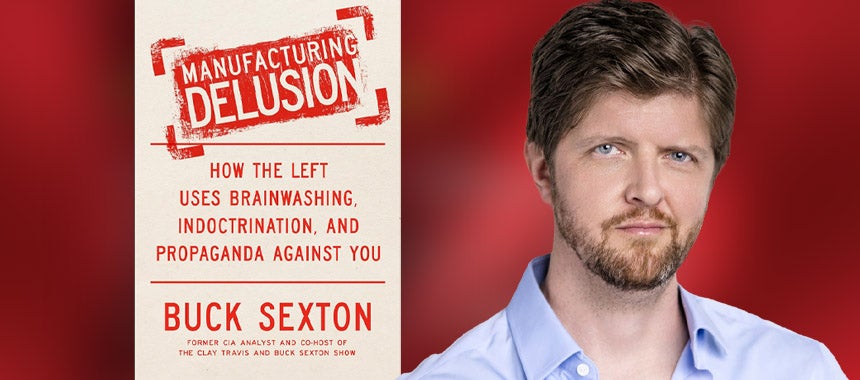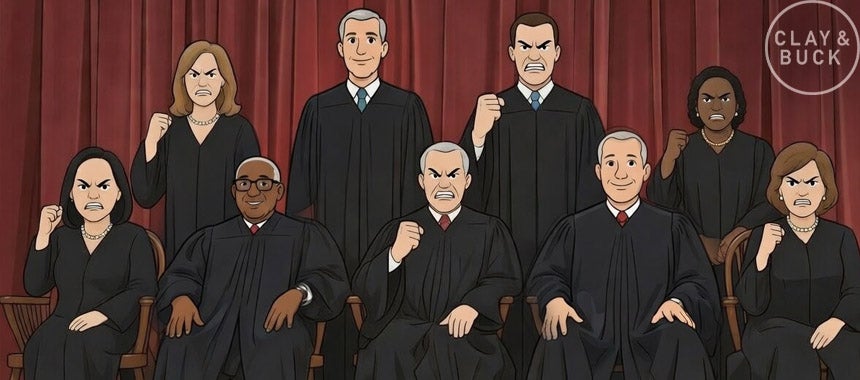Parents Across America Rebel Against CRT
23 Jun 2021
BUCK: Now we get into the rebellion of parents in Loudoun County, Virginia, a place I know pretty well from time that I worked in northern Virginia for the federal government. Langley. Loudoun County is pretty close by and you had… Well, I think one of the best ways to explain what’s going on, there’s a rebellion against CRT. There are people who are greatly upset at both the transgender policies as well as some of the critical race theory instruction.
Here’s a sense of what’s going on, what’s being said. Let’s play cut 10.
ILYSE KENNEDY: Everything I thought about how I existed in my white body in the world was very wrong. (chuckles) We’re unpacking wrong things that we have been taught in history class. There is a period of deep shame for being white and for acknowledging the harms that our ancestors have caused.
WOMAN 1: White accountability groups are really helpful in terms of having a place to process, having a group of people whose responsibility it is to call me on things or to challenge me.
WOMAN 2: The more you kind of dive into that, the more I’m really realizing how deeply rooted racism is into, like, my everyday thought process, no matter how much you work at that, there’s still even almost more work to be done.
BUCK: So, this is some of the left-wing theory around CRT. We’ll get into the parents and the Loudoun County rebellion, Clay, but this is actually from the Washington Post. They had a video out that was talking about “white accountability groups.”
CLAY: So, we talked about the fact that over half of Americans have been born since 1981. I went, Buck, to public school in Nashville, Tennessee, K through 12, integrated public school. And I’m wondering as I sit and I listen to these kind of clips, what am I accountable for? What? In the grand scheme of things here, what am I supposed to be apologetic for?
Moreover, I’m at least 42. I was born around 1980 — ’79, to be exact — but what are my kids accountable for? And that’s what these parents that we’re gonna hear from in Virginia are talking about right now, Buck. They’re raising, I think, legitimate questions about young kids being instructed that because they happened to be born white, they are racist — or because they happened to be born black, they are victims.
Long before they even have come to understand very much about themselves at all. And ultimately what this critical race theory is designed to do is destroy the basis for American exceptionalism. That’s really what it is, right? Because if America is not an exceptional democratic country which people are dying to get into every day, Buck.
Then after our institutions can be torn down and destroyed because at their root, as critical race theory would argue, they are not worthy of protection because all of our founding documents — the Constitution, the Declaration of Independence — according to critical race theory and according to this ridiculous 1619 Project, all of it is rooted so despicably in racism that none of it can be supported any longer.
BUCK: Undermining key documents, foundational concepts of America, if you were a radical, revolutionary leftist, that would be a really useful thing to do. If you wanted, dare I say, fundamental transformation of this republic, it would be very helpful to get rid of not just the shared bonds of our history, but also some of the institutions — namely, the Constitution and others — that keep us on the same page.
CLAY: A whole bunch of old white guys were involved in, Buck. That’s what the critical race theorists would tell us, and, therefore, we don’t need to care what those people think.

BUCK: So the white accountability groups video that we played for you just a moment ago was put out from the Washington Post on Friday as part of its series The New Normal, and those are some of the basic critical race theory concepts in action, which is that you have to confront your whiteness, you have to — essentially, to your point about what’s the responsibility here — embrace intersectionality.
This is the left-wing framework for interlocking oppression all throughout our society. There is a hierarchy. Some people are oppressed. Some people are victimizers. And we have to always take that into account. And it doesn’t matter what your individual actions are.
In a sense, this eradicates individual morality and actually agency because — to your point about your kids — if you’re responsible for something you did not do, had no hand in, and they can’t even point to an action that contributes to that you have done as a person, what are you? If we’re all collectively guilty, no one’s really guilty is how this all starts to break down.
CLAY: And what it is is so myopic in many ways, however, ’cause it only focuses on a relatively small part of human history. Because if you are actually interested in world history, what is fascinating to me about American life and existence is what a tiny pinprick we are of the overall world history. And ironically with the whole 1619 Project…
I know you’re a history guy, too, Buck. In 1619, we were British colonies. If you’re really fired up about reparations — and no one ever makes this argument, but I do think it’s a fascinating one from a historical and logic perspective — the United States as an independent nation only had slavery for 80 years: From 1783, when we won our independence from England, to 1863 when the Emancipation Proclamation was officially taking effect, is 80 years.
So 1619 up to 1783, if you’re angry about that, hey, that’s Britain; go get reparations from them. You got an 80-year window but since 1863, pretty long window now, there has been no slavery in the United States. So we’re talking from 1619 all the way up to the present day about 80 years when the United States of America had slavery, and even then it wasn’t in every state.
BUCK: To give you a sense of how radical the left-wing argument on this can become, they’ll even start to say that because oppression is more invisible and more passive, and you have more subconscious racism, we have to work even harder —
CLAY: To eradicate it.
 BUCK: — because it’s everywhere and it’s omnipresent, don’t you see? It may be at a low level. It’s almost like virus that’s freely floating in the air, but somehow, they can’t tell us who’s actually getting sick or who’s responsible for it. This is the way that they are able to continue with the CRT rhetoric.
BUCK: — because it’s everywhere and it’s omnipresent, don’t you see? It may be at a low level. It’s almost like virus that’s freely floating in the air, but somehow, they can’t tell us who’s actually getting sick or who’s responsible for it. This is the way that they are able to continue with the CRT rhetoric.
I did want to have Rachel Pisani (who was on Fox & Friends in the morning) who is one of the parents at Loudoun County, to bring us back to the Loudoun County CRT we will be. Here is how she describes what her kids actually get taught in school. At this school board meeting, they had a big fight about it, we’ll get into it. Here’s what she said.
PISANI: The parent protests won’t stop. I mean, we are an army of moms and parents that will not stop until we’re heard. So they can mute our mics; they can arrest us; they can kick us off of public property. We’re not gonna stop. They will fire any teacher that is not culturally in agreement with the school board and their tactics. This is insanity in America. This isn’t freedom of speech, not freedom of religion. It’s racism, and it’s cloaked in socialism.
CLAY: Well said. And I would point out this as well, Buck, in what you were just talking about and what she is talking about in Virginia and what is going on all over this country. There has been a big shift, and you’re seeing it in the talking points, which is very Orwellian.
I had a good friend of mine from law school recently. She said, you know, you really need to go back and read 1984 again because a lot of people talk Orwellian — they used that adjective, Buck — to kind of describe what things are going on. But most of us aren’t thinking about what we may recall from reading that book in high school or when we were younger.
And so I recently went back and started reading that — same thing with Fahrenheit 451 — and so much of it… And frankly, if you want to read Animal Farm as well. So much of it is about changing what basic words mean. And one that goes to the essence of this with critical race theory — and you’re seeing it happen. Pay attention to how often you’re seeing this now.
For most of my life, Buck, we talked about equality in America. What we sought was equality. Now, equality is a difficult goal to reach because we’re all fundamentally different in many different ways. We all have different attributes. We all have different flaws. So equality is an aspirational goal.
So what we are seeking is equality from the government. In other words, the government treats everyone equal. Now, what you’re seeing — and it’s only happened in, like, the last year — everybody’s seeking “equity,” which is something that is vastly different than equality.
“Equity” is about charging people and making them pay a price for something that they may have nothing to do with at all. And I want all of you out there with us talking about this conversation to start to pay attention. Buck you, have you noticed that?
BUCK: Of course.
 CLAY: The change from equality to equity? I think it’s so seductive in the way that the talking points changed. And I think those words are similar enough that people don’t focus on it as much. But CRT is about equity, not equality.
CLAY: The change from equality to equity? I think it’s so seductive in the way that the talking points changed. And I think those words are similar enough that people don’t focus on it as much. But CRT is about equity, not equality.
BUCK: Even the expansion of what we were talking about yesterday, white supremacy, everything. Everything… It used to be white supremacy as a term was universally understood in America as hateful, neo-Nazi, active, racist, bad people, who were —
CLAY: — KKK burning the cross in people’s yards. That was white supremacy.
BUCK: They were on the fringes, rightly so, of society, a tiny, tiny percentage overall of the American people. And yet now, because of the association of white supremacy, and rightfully so, very bad, now they said, “Well, college admissions can be white supremacy, and these other…”
And that, then, forces… In the same Orwellian word game fashion, that forces people to defend what the left has now decided falls under this umbrella of white supremacy. “What do you mean that you don’t want there to be equity in hiring? Don’t you want to dismantle structures of white supremacy?”
It’s a trick, but it’s a very effective one. By, just one more very clear example of this, Clay, we’ve gone ’cause we talked about immigration today, weave gone from “illegal alien,” the official federal government term in the U.S. legal code, to then it became more “illegal immigrant,” to then it became “undocumented,” right?
That’s an important shift as well, because they don’t want the term to actually reflect illegality, even though that’s what we’re talking about. All you gotta do with the undocumented is give them documents. That’s all that it is. Amnesty is the solution, you see. There’s no problem anymore.
CLAY: It’s downright terrifying when you think about it. And I know that many of our listeners are out there thinking about it on a daily basis. And I think about this from the perspective of a parent. Because I’ve already been through school. I went to public school K through 12 for better or worse.
But I think a lot about what my kids are being taught and what they are being taught about American history. And to me, as a nation, we have to ensure that we have a universal narrative that we can all believe in. And America as the shining city on the hill was what I grew — in my multiracial school — studying. And now we’re hearing oppressor, victimization, equity.
BUCK: The Loudoun County school superintendent declared a meeting — this was just in the last 24 hours — an unlawful assembly. There were actually… We’re getting to the point now, Clay. This is why I’m using the term rebellion, parents are getting arrested over this because they insist on having their voices heard and education bureaucrats don’t want to hear it. They prefer the situation of the right just being silent and allowing this had to happen.
CLAY: It’s insane. It’s ridiculous.
Recent Stories

Soren Aldaco: A Detransitioner's Story
One of our most powerful interviews in recent memory. Don't miss it.
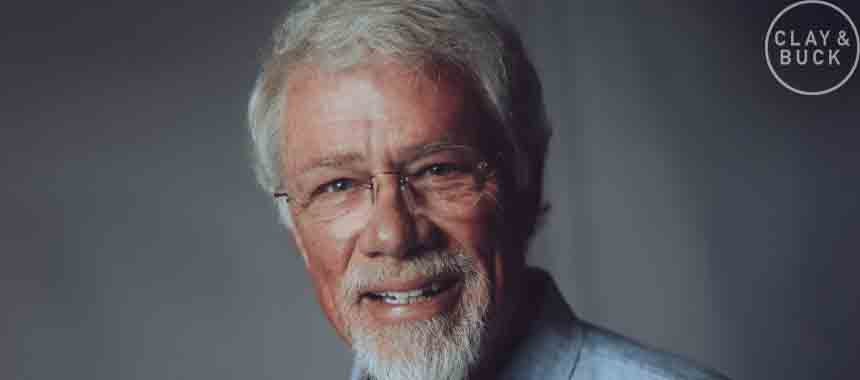
Jeff Hays, Director of MAHA Uncensored, a Hard Look at the Business of American Medicine
An inside look at what drives the American medical system.
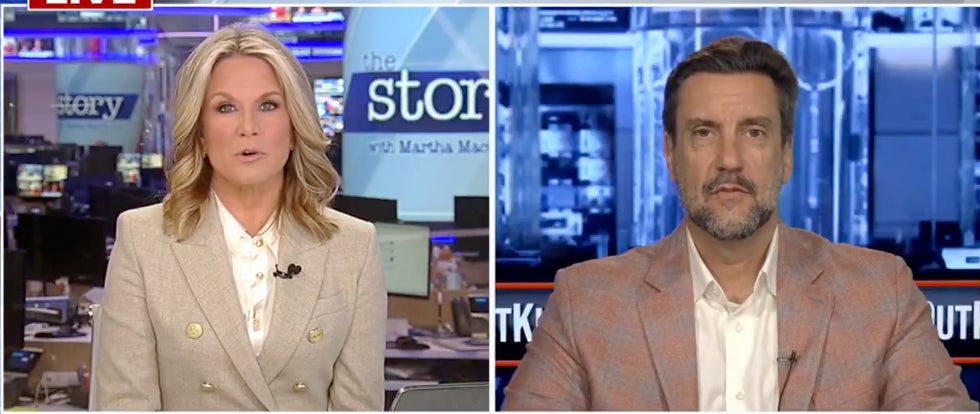
Clay Praises Alysa Liu's Gold Medal for the USA
Miss Clay on The Story with Martha MacCallum? Watch it here.


